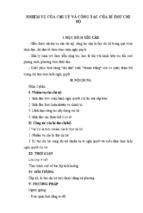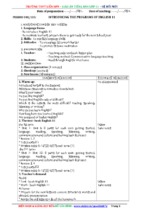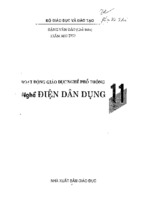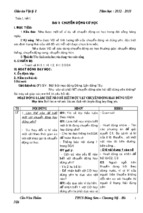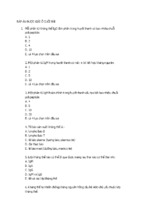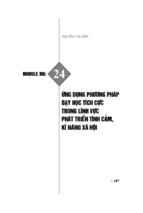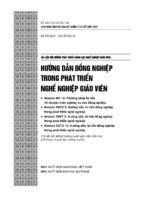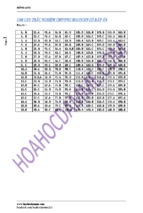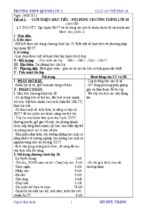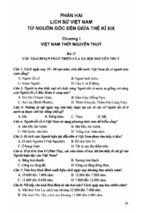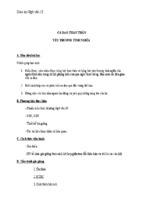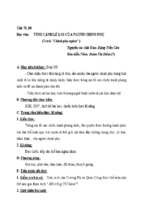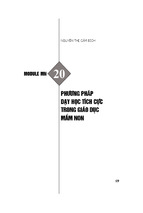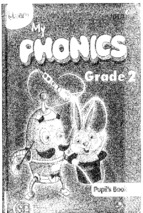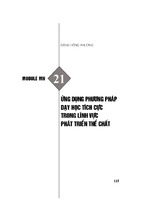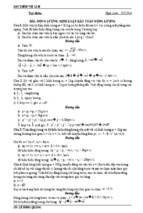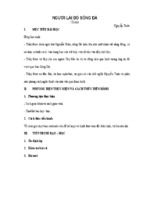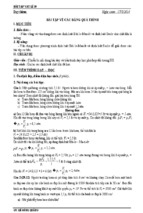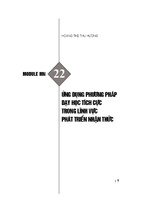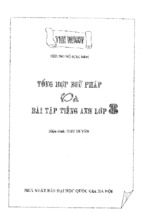Còn thiếu g/ a các phần: writing, test yourself.
Tuy nhiên g/a phần nào có rồi, các bạn cũng nên gửi tiếp, vì mình
còn chọn ra g/ a phu hop voi minh nua.
Co 1 giao an cua Tram va Nhan, 2 giáo án của Tố Trinh+ Uyên
thuoc unit 10 nen Vy ko gop vao day nghe.
1 giáo án writing của Chiêu Hoàng có nội dung là speaking > Hoàng
có 2 giáo án speaking giống nhau nên bỏ một cái
Nhiet tinh gui bai tiep nhe!
Unit 11: NATIONAL PARKS
A. Reading
Nguyễn Thị Chiêu Hoàng - Chu Thị Lý
Time allowed: 45 minutes.
Aims: By the end of this lesson, Ss are able to:
- Practice reading skills for specific information.
- Improve Ss’ knowledge about national parks.
- Read and talk about forest.
- Learning some new words related to forests.
Lexical items: Nouns: Species, survival, sub- tropical, contamination.
Verb: (to) establish, (to) contain.
Teaching aids:
Textbooks
Chalks
Blackboard
Handouts
PowerPoint 2010
Pictures.
Skills:
- Speaking: talk in pairs and in groups.
- Reading comprehension: enhance Ss’ reading skills through matching the words in the passage
with definitions, T/F statements, and answering the questions.
Lesson Plan
Time
5
min
5
Min
4
min
Contents
Warm-up
Show a short video (2 minutes) about
some national parks in Vietnam and
over the world and ask Ss to give the
names of these national parks (Keys:
Cuc Phuong, Cat Tien, U Minh,
Nairobi, Everglades, and Bach Ma).
Pre- reading
Eliciting vocabulary
- Establish (v): using picture
- Contain (v): explanation.
- Species(n): using picture
- Survival(n): translation
- Sub- tropical(n): using picture
- Contamination (n): antonym of
pollution.
Checking vocabulary: Matching with
definitions(Task 1 pp. 113)
2.contain
3. species
4. survival
5. sub-tropical
Aims
Teacher’s activities
Students’
activities
Make an
exciting
atmosphere
before
beginning
the lesson
-
Play the video.
Ask Ss to take
notes the names
of these national
parks.
-
Induce the
students’
motivation.
-
Call some Ss to
give their
answer.
-
-
Give feedbacks
and correct the
answers.
-
Elicit and model
-
-
Ask Ss to repeat
2 times each
word.
-
Help Ss to
elicit the new
words by
themselves.
-
Establish
background
knowledge
of the
context.
-
Prepare
-
-
Ask 3or 4 Ss to
speak aloud.
Ask Ss to copy
down.
Ask Ss to match
-
Watch the
video
Write down
names of
these
national
parks.
Present the
answers in
front of
class.
Try to
guess the
new words.
Repeat the
new words
2 times.
Speak
loudly
Write down
new words.
Read and
do the Task
1
6. contamination
information
and
vocabulary
for the topic
-
-
5
min
T/F statements predictions:
1. Cuc Phuong National Park is
located 300 kilometers south
west of Hanoi.
2. Nairobi National Park is
Kenya’s biggest park.
3. Visitors learn about the habits
of animals in Nairobi National
Park.
4. Everglades National Park is a
tropical wilderness in the
southeastern United States.
5. The contamination has
threatened the park and many
of the animals in Everglades
Park.
Making
predictions
before
reading
the words in
column A to
definitions in
column B.
Select several
students to
answer the
questions.
Listen and give
remarks.
-
Write the
answers on
the board.
-
Correct the
answers
into
notebooks
-
Receive
handouts
Underline
the key
words.
-
-
-
Give handouts
Ask Ss to
underline the
key words.
Ask Ss work in
pairs to make
prediction T/F
before reading.
Invite Ss to give
their ideals.
-
-
Work in
pairs to
compare
the
answers.
Give the
prediction.
5
Min
While-reading
Task 1: T/F statements
Keys: 1.F 2.F 3.T
4.F 5.T
Practice
reading skills
for specific
information
-
-
-
10
min
Task 2: Game- Lucky number
There are 8 numbers from 1 to 8.
Number 3 and 6 are lucky numbers.
Ss of 2 teams choose the numbers and
answer 6 questions; each group will
get 10 points for a right answer:
1. What is the area of the rainforest in
Cuc Phuong National Park?
2. Why would November be a suitable
time to visit this park?
What can people learn in Nairobi
National Park?
4. What kinds of animals are taken
care of in the Orphanage?
5. Why is Everglades National Park
endangered?
7. What do you think will happen to
Everglades National Park if more
chemicals are released into the water?
Keys:
1.160 kilometers
2. Because the rainy season is over.
4. They can learn about the habits of
animals and how one species is
dependent upon another for survival.
5.In the orphanage, orphaned and/ or a
Make an
exciting
atmosphere
in class.
Give
motivation to
Ss to find out
the answers
-
Ask Ss to
highlight or
underline the
information in
the passage that
helps Ss to find
the correct
answers.
Ask Ss to read
the passage
again and give
the answers.
Giving
feedbacks and
correct the
answers.
-
Correct the
false
information
.
-
Read the
passage
individuall
y
Say out the
answers.
Take notes
Introduce the
instruction.
Divide the class
into 2 groups:
A&B.
Organize the
game.
Give the
answers on the
screen.
Ask Ss to write
down the
answers.
-
-
-
-
Listen to
the
instruction
Work in
groups to
find out the
answers.
Copy down
the
answers.
bandoned animals are taken care of.
7.Everglades National Park is endange
red because of the toxic levels of chem
icals in the water
8. If more chemicals are released into
the
water, plans and animals will die/ be ki
lled/ destroyed
11
min
2
min
Post-reading: Interviewer
- Ss are required to work in
group of four and interview 3
friends in their groups about
“Which of the national park
would you like/dislike to visit.
Why? ”
- Some Ss talk about what they
have interviewed in front of
the class.
Enhance Ss
knowledge
from the
passage
Homework:
Summarize some main information of
3 parks
Summarize
the passage
Prepare speaking lesson
-
Give
instructions to
students.
-
-
Ask some Ss to
speak out their
interview.
-
Preparation
for the next
lesson.
-
Ask Ss copy
down the
homework into
notebooks.
Listen to
the
instructions
.
Interview 3
friends in
group.
Speak out
in front of
the whole
class.
-
Copy down
the
homework
-
Do the task
at home
Appendix
Handout:
Name of National Park
Like
Cuc Phuong
Ex: Lan
Dislike
Why?
Ex: To study butterflies, visit caves…
Nairobi
Everglades
B. SPEAKING
Nguyễn Thị Chiêu Hoàng – Chu Thị Lý
Time allowed: 45 minutes.
Aims:
- Language content:
To improve students’ skills of making plans and talk about an excursion.
To provide students with some new words relating to an excursion.
- Language functions:
To enhance students speaking skill: expressing regrets by using conditional
sentence type 3.
To enable students to guess the meaning of the words based on the context,
pictures and explanations.
Teaching aids:
Handouts
PowerPoint 2010
Pictures.
Posters
Lesson Plan
Tim
e
5
mins
13
mins
Teacher’s activities
1. Warm up: BRAINSTORMING
- Divide class into 4 groups.
- In each group, ask students to write a list of things
they will prepare for a trip within 2 minutes.
- After 2 minutes, check which team has longer list of
things will be the winner.
- Excepted answers:
Breads, fruits, soft drinks
Medicines
Sleep-bag
Money
Tents
…
2. Pre-speaking
Task 1 pp.114 : Matching
- Ask students to read through these sentences in the
two columns.
- Encourage them guess the meanings of the words in
the Task. Then, provide students with some new
words or expressions:
Food poisoning (n): an illness usually caused
by eating harmful food. (using explanation)
Fine (n): cash paid as punishment
Student’s activities
-
Work in groups
to discuss.
-
Give the answer
to teacher.
-
Take note the
answers.
-
Read all of
sentences and
try to find some
new words.
-
Try to guess the
meaning of new
words.
-
Copy down
vocabulary into
their notebooks.
(Using example:
1. I've just had to pay £10 for a parking fine.
2. The librarian slapped a fine on him for
returning the books late.)
Get lost (v): to become lost; to be unable to
find way (Using explanation).
Carsick (n): feeling sick because of the
movement of a car. (using explanation and
picture)
-
-
-
-
Read each new word and ask students to repeat it
twice times.
Ask 2-3 students to read aloud all new words in front
of class.
Listen and help students to correct their mistakes in
pronunciation.
Ask students to work in groups of 8.
In each group, ask students to count themselves from
1 to 8:
Member 1 does sentence 1.
Member 2 does sentence 2.
…
Member 8 does sentence 8.
Then, ask each member to write their own sentences
on posters.
After finishing, ask all groups to compare their
answer with other groups.
Call a member number 1 to read sentence number 1
and ask other members number 1 to correct. Other
sentences are the same.
Give feedback and correct answer.
Expected answer:
1-f They went by coach and most of them got
carsick.
2-e They did not bring enough food and drinks
and/so they had to spend a lot of money eating in
expensive restaurants.
3-h Some had food poisoning so they didn’t enjoy
the visit.
4-g They had no raincoats so they got wet and some
-
-
Listen and
repeat new
words.
Work
individually.
Correct the
mistakes.
Work in groups.
Count number
from 1 to 8 in
their own group.
Do the task
themselves.
Write down the
answers.
-
Exchange the
posters.
-
Read the
answers aloud.
-
Listen and
correct the
sentences.
got a cold.
5-b Some left their luggage on the coach when they
arrived so they had no clothes or money with them.
6-c Some were not careful when walking in Huong
Pagoda so they got lost.
7-a Some threw waste in the forest so they got a fine.
8-d They stayed there only one day so they couldn’t
visit all the pagoda.
15
mins
3. While speaking
Task 2 : pp. 115
- Present and explain the conditional sentences
type 3:
Use: Conditional sentence type 3 is used
to express the unreal conditions in the
past.
Form:
'IF' CLAUSE
-
Try to find
out the new
grammar
point.
-
Look at
teacher’s
examples.
MAIN CLAUSE
If + S + PAST PERFECT, S + WOULD/COULD HAVE+ PP
(HAD + PP)
-
Give 2 examples:
Ex1: Real condition: I failed the exam.
If I had studied harder, I would have passed the
S Had+pp ,
S would have pp
Ex2: Real condition: He
got wet.
If he had taken an
umbrella, he
would have not got
wet.
S Had +
pp ,
S
would have
pp
-
-
Call 1 or 2 students give other examples using
conditional sentence type 3.
Ask students to take note the grammar form into
notebooks.
Give the instruction of the task 2: “Most of the
students in Nga’s class are not happy with their
excursion to Huong pagoda. Now they are
talking about what they wish they had or hadn’t
done.”
Model by giving an example for students:
Ex: 1. They went to Huong Pagoda by coach and
most of them got carsick
-
Give other
examples.
-
Take notes.
-
Listen to
the
instruction.
If we hadn’t gone by coach, we could/would
not have got carsick.
-
Work in
pairs.
-
Present in
front of the
class.
-
Correct if
necessary.
Copy down
the
answers.
-
-
2.
3.
4.
5.
6.
Ask students to do the task by using the ideas in
Task 1.
- Go round the class and provide help if necessary.
- After 3 minutes, ask them to compare the
answers and call some pairs to practice the
exchange in front of the class.
- Listen and help students to correct their mistakes
in pronunciation.
- Give comments and correct the answers.
Expected answers:
If we had brought enough food and drinks, we
wouldn’t have had a lot of money eating in expensive
restaurants.
If some of us hadn’t had food poisoning, we could
have enjoyed our visit.
If we had had rain coats, we wouldn’t have got wet
and have got a cold.
If some of us hadn’t left our luggage on the coach
when we arrived, we could have had clothes and
money with us.
If we had been careful when walking in Huong
pagoda, we wouldn’t have got lost.
7. If we had thrown waste in the forest, we wouldn’t
have got a fine.
8. If we had stayed there more than one day, we could
have visited all the pagoda.
10
mins
4. After Speaking: Role Play
- Give the instruction: “Look at this dialogue. You
are Nga. Work with a partner. Tell her/him about
your class excursion to Huong Pagoda and
express your regrets about what you did or did
not do during the excursion by changing the
underlined sentence using conditional sentence
type 3.The first sentence had been done for you:”
Model:
Oh! It was…
-
Listen to
the
instruction.
-
Look at
teacher’s
model.
-
Answer the
questions.
Hi, Nga!...
Lan: Hi, Nga! How was your excursion? Was it fun?
Nga: Oh! It was so terrible?
Lan: Really? What happened?
Nga: Um. If we hadn’t gone by coach, we wouldn’t
have got carsick.
- Call a good student to be Lan and practice the
dialogue.
- Ask some comprehensive questions to check
students’ understanding:
What will we do? ( make a dialogue)
How many people are there? (2)
How many sentences in the dialogue? (4)
Which sentence will we need to change? (the
-
underlined sentence)
Then, ask students to work in pairs to role plays
the dialogue.
Go around helping Students if necessary.
Call some pairs of Students to present the
dialogue.
Listen and help students to correct their mistakes
in pronunciation.
Give feedbacks and correct the answers.
2
Home work :
mins
- Write a short paragraph of your regrets about
what you did or did not do to protect the
environment.
- Prepare for the next lesson.
B. SPEAKING
Nhi + Hoàng Uyên
-
Work in
pairs to do
the task.
-
Speak
aloud the
dialogue.
Correct the
mistakes.
-
-
Copy down
into the
notebook.
1. Aims:
At the end of the lesson, students are able to:
Make plans.
Express regrets by using conditional sentence type 3.
Talk about an excursion.
2. Time allotted:
45 minutes
3. Teaching aids: -Teacher: Board, textbook, chalk, pictures, projector…
-Students: Textbook, notebook,....
4. Procedures:
Teacher’s activities
Checking the student whole lesson:
Students’ activities
1. Warm-up:(3 mins)
- Ask Ss to watch the video carefully and write - Work individually and try to take
down the names of the places appearing in the notes as many places as possible.
video into a card.
- Show the video including these pictures:
One pillar pagoda
Hue citadel
Huong pagoda
Hung King temple
- Ask Ss to give answers, show the pictures again - Report the list in front of the class.
to check with whole class, and give Ss
compliments with each correct answer.
2. Presentation
A. Pre – teaching vocabulary: (5ms)
- “ She ate an out-of-date cake so she had to go to - Guess the meaning of the new words
the hospital. The doctor said that she had food and copy down them into their
poisoning”
notebooks.
What does that mean by “food poisoning”?
Food poisoning (n):
Ngộ độc thức ăn- “ Thing
you bring together when you
go
traveling
is
called
luggage”
(Show a picture)
What does that mean by “luggage”?
Luggage(n): Hành lý.
- “get lost” means “unable to find the way to
somewhere”
What does that mean by get lost?
Get lost(v): lạc đường.
- Listen and repeat new words.
- Read new words and ask students to repeat. Ask - Work individually.
2 Ss read aloud all new words and correct the
pronunciation if necessary.
B. Presenting the speaking (6ms)
- “ We have just visited the four famous places in
Viet Nam at the warm-up activity. Now, I would
like you to get to know the excursion of Nga’s
class to one of the above places – Huong Pagoda.
Nga’s class came there last week. Unfortunately,
the excursion turned out to be a disaster.
- Work in pair.
- Why was that excursion unhappy? To find out
the reason, please work in pairs to combine the
things in column A with the corresponding
consequences in column B in textbook page114.
You have 2 minutes.
- Give answers orally.
- When Ss finished, ask them to give the right
- Listen to their friends to check
order of the list
themselves the answer.
- 1 f 2 e
5 b 6 c
3 h 4 g
7 a 8 d
- Give answers individually.
- Then ask Ss to give answer by using the
1. They did not bring enough food and
structure: “…so…”
drinks so they had to spend a lot of
- Give an example: “They did not bring enough
money eating on expensive
food and drinks so they had to spend a lot of
restaurants.
money eating on expensive restaurants”
2. Some had food poisoning so they
- Listen and correct if necessary.
didn’t enjoy their visit.
3. They had no raincoats so they got
wet and some got a cold.
4. Some left their luggage on the coach
when they arrived so they had no
clothes or money with them.
5. Some were not careful when
walking in Huong pagoda, so they got
lost.
6. Some threw waste in the forest, so
they got a fine.
7. They stayed there only one day, so
they couldn’t visit all the pagodas.
3. While speaking: (14ms)
Activity 1:
- “ We have just read about the problems of the
excursion of Nga’s class. Clearly, most of the
students in her class are not happy with their trip.
Now they are talking about what they wish they
had done or hadn’t done.
“ If we hadn’t gone by coach, we wouldn’t have
got carsick”
“ If we had gone by bike, we wouldn’t have got
carsick”
- Observe and conclude the structure.
-“Could you give me the structure of those - Give the structure to the T and listen
sentences?
to the correction.
- Give the correct structure.
- Give the meaning and the usage of the structure
( to express conditions in the past that did not
happen, express regrets )
If + S + had + p.p (v.ed / v3) , S + would /
could / might + have + p.p (v.ed / v3)
- Work individually.
- Ask Ss to give one more example with one of
the sentences in Task 1.
“ If we hadn’t stayed there only one day, we
could have visited all the pagodas”
- Ask Ss to work in pairs and continue the talk of
Nga’class, use the ideas in Task 1.
- In pair, ask one student to read one problem and
the other use the conditional type 3 for that
problem and vice versa for the next, continue to
the last sentence in Task 1.
- Listen to the teacher and observe the
- Model with one student:
teacher’s modeling.
A: We went to Huong Pagoda by coach and most
of us got carsick.
B: If we hadn’t gone by coach, we wouldn’t have
got carsick.
( If we had gone by bike, we wouldn’t have got
carsick.)
- Work in pair to talk about the
- Move around the class, keep control on Ss.
excursion of Nga’class to Huong
pagoda and express their regrets about
what they did or did not do during the
excursion.
1. A: We went to Huong Pagoda by
coach and most of us got carsick.
B: If we hadn’t gone by coach, we
wouldn’t have got carsick.
( If we had gone by bike, we wouldn’t
have got carsick.)
2. A.We didn’t bring enough food and
drinks, so we had to spend a lot of
money eating in expensive restaurants.
B. If we had brought enough food and
drinks, we wouldn’t have spent a lot of
money eating in expensive.
3. A.Some had food poisoning, so we
didn’t enjoy our visit.
B. If some hadn’t had food poisoning,
we would have enjoyed our visit.
4. A. We had no raincoats, so we got
wet and some got a cold.
B. If we had had raincoats, we
wouldn’t have got wet and have got a
cold.
5. A. Some left our luggage on the
coach when we arrived, so we had no
clothes or money with us.
B. If some of us hadn’t left our
luggage on the coach when we arrived,
we would have had clothes and money
with us.
6. A. Some were not careful when
walking in Huong Pagoda, so we got
lost.
B. If we had been careful when
walking in Huong Pagoda, we
wouldn’t have got lost.
7. A .Some threw waste in the forest,
so we got a fine.
B. If we hadn’t thrown waste in the
forest, we wouldn’t have got a fine.
8. A. We stayed there only one day,so
we couldn’t visit all the pagodas.
B. If we had stayed there more than
one day, we would have been able to
visit all the pagodas.
- Xem thêm -

